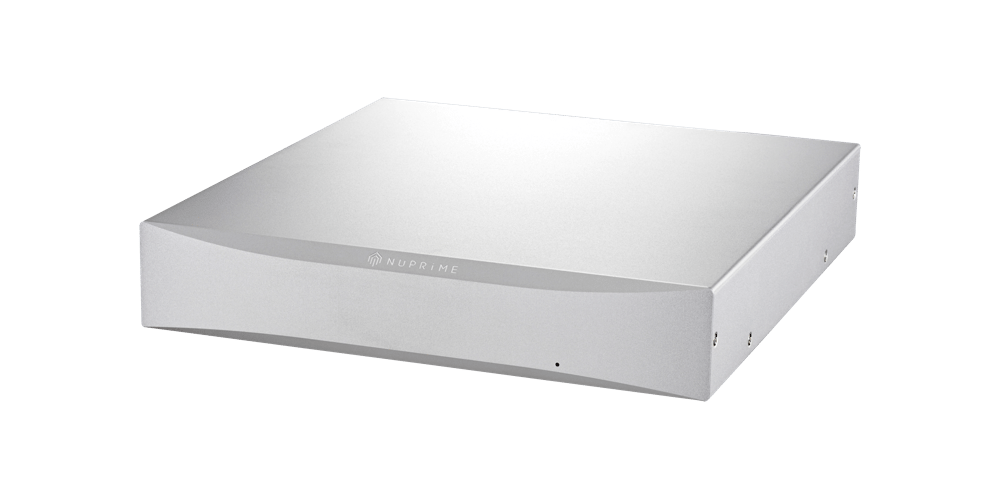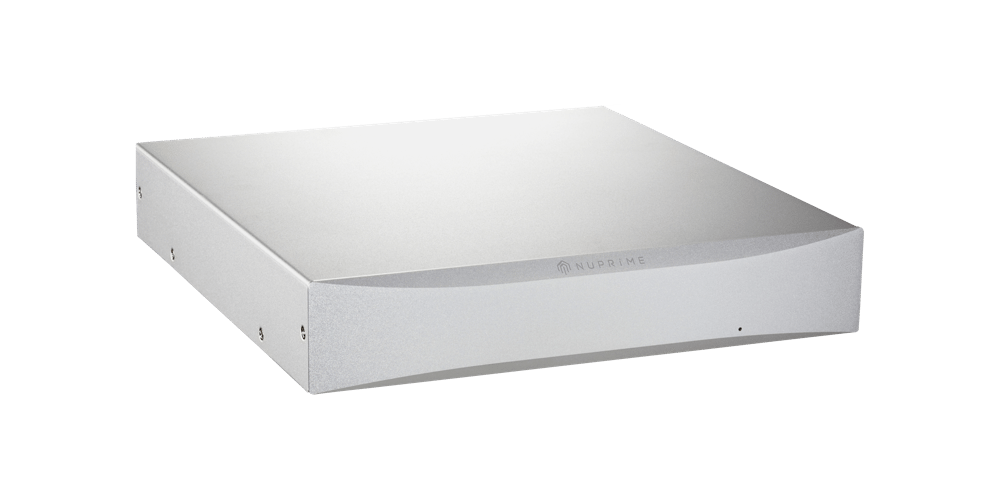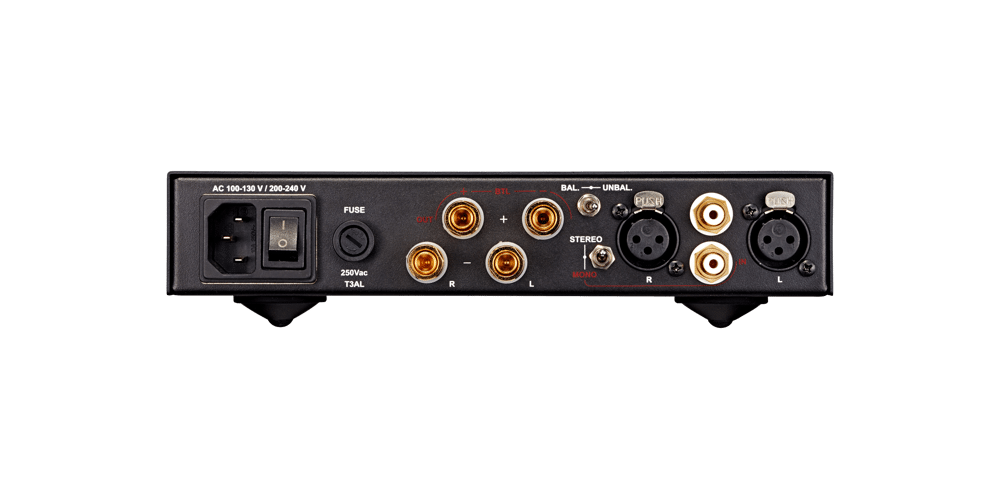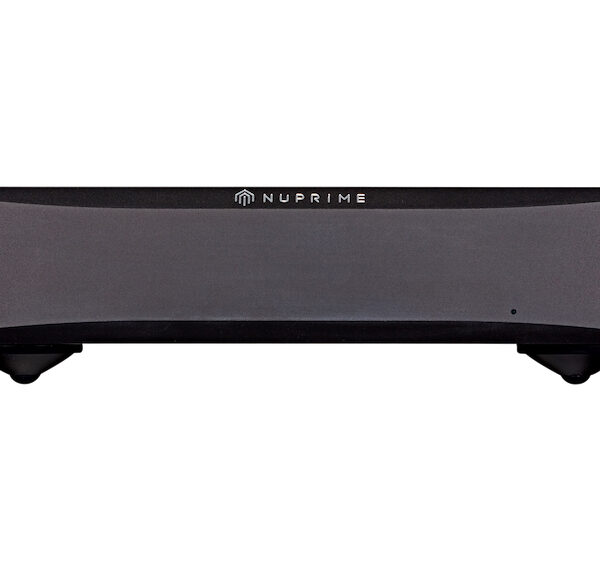STA-9
$ 989.00
Class A+D Stereo Amp bridgeable into a 290W mono amp
The NuPrime STA-9, a 2 X 120W Class A+D stereo amp, bridgeable into a 290W mono amp, is designed with enhanced even-order harmonic circuitry that mimics the most attractive features of tubed-amp sound without incurring tubes’ drawbacks and limitations. The STA-9’s spacious, transparent, dynamic and luxuriously textured soundstage has to be heard to believe.
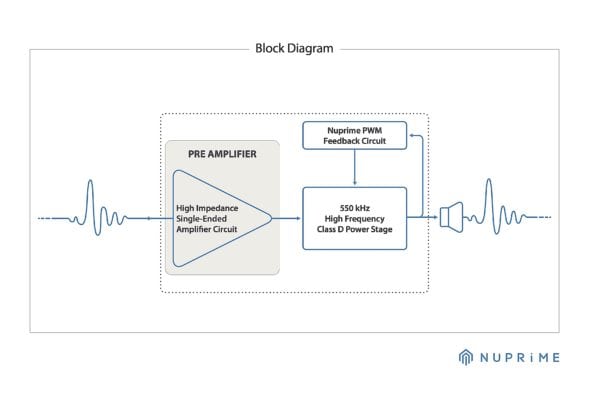
The STA-9 amplifier is derived from the ULCAM (Ultra Linear Class A Module)+Class D design first introduced in the IDA-8. By joining a powerful high impedance singled ended amplifier circuit in the preamp stage with a well integrated Class-D power stage, the STA-9 delivers a rich tube-like sound with the remarkable speed and clarity of NuPrime Class-D design. Audio enthusiasts are bound to be impressed.
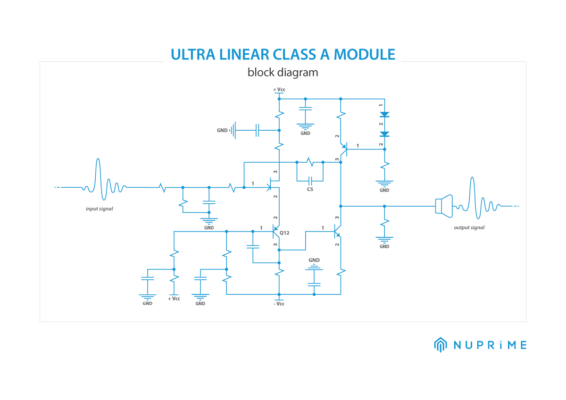
The NuPrime amp circuit improves on traditional Class-D design by using a self-oscillating circuit to generate pulse-width modulation. The amplifier switches at a frequency of 550kHz, well beyond the compact disc’s 44.1kHz sampling rate. Most class-D amps switch at 300kHz or lower. Completing the ensemble is NuPrime’s new linear power supply with its high-efficiency toroidal transformer for reduced high-frequency noise and strengthened low-frequency performance. The damping effect of the NuPrime isolation feet (patent pending) absorbs and cancels vibrations that degrade audio performance. The overall result is unprecedented transient speed and an almost shocking level of dynamic impact.The STA-9’s frequency response to 50 kHz elevates vocals into emotional experiences; similarly, instrumental upper registers mimic a live performance’s shimmering heights.
Features:
Single End Class A + D amplifier design
Bridgeable allowing switch between stereo or mono mode.
Enhanced even-order harmonic (H2) circuitry resembling the most attractive features of tubed-amp sound without its drawbacks and limitations.
Highly reliable under no-load condition and enhanced short circuit protection.
High output current drive capability for low impedance speakers.
550 KHz switching frequency for accurate reproduction of musical signal.
New linear power supply with a high-efficiency toroidal transformer. Reduced high-frequency noise and strengthened low-frequency performance.
Signal path avoids cross-linking capacitors, thus achieving a frequency response at DC level for pure musical enjoyment.
How did STA-9 achieve tubed-amp sound?
The front-end circuit of the STA-9 employs the same structure as that of the HPA-9: a single-end JFET structure that mainly simulates the sound characteristics of a triode by the addition of 2nd harmonics. The 2nd harmonic of a vacuum tube and STA-9 are high, resulting in an SNR measured value > 90DB. This does not mean that the STA-9 produces audible noise; rather, it is the effect of 2nd harmonic’s appealing coloration. The bandwidth of the front-end circuits of the STA-9 and HPA-9 are up to 300KHZ, which produce a more natural sound. With very low negative feedback, the sound is smooth and relaxed rather than harsh.
How did STA-9 mono achieve better sonic characteristic, in addition to more power than STA-9 stereo ?
The standard method for bridging a stereo amp into mono employs a series of op amps (OPA) in order to invert the input signals to one of the stereo amp, thereby creating an opposite phase, which can then be combined to increase power. Conversely, the STA-9’s innovative bridging circuit utilises a design we call Single-Ended Direct-Inject Bridge Technology, in which the mono mode, in addition to acquiring more than double the power, sounds livelier and more dynamic.
The NuPrime Sound
Vast soundstage
Wide, lightning-fast dynamics
Ultra-low distortion and noise
Music emerges from a pristine background, with delicate details and nuances intact
In summary, NuPrime’s sonic character stands well apart from – and indeed above – the soft, cushy sound we often associate with most tubed amplification or the dry, clinically edgy sound we often associate with solid-state and switching technology. Rarely does an amp achieve an ideal balance of richly textured timbres and harmonics, bottom-end authority, startling dynamics, exquisite low-level detail, and a fully revealed, fully dimensional soundstage against a backdrop of mile-deep silence.
- Inputs:
- RCA: Un-Balanced input x 1
- XLR: Balanced input x 1
- Outputs:
- Stereo Speaker Out x 1 or
- Mono Speaker Out x 1
- Power: 2 X 120W / 1 X 290W @ 8 & 4 Ohms
- Peak Output Power: 2 X 280W / 1 X 320W @ 8 & 4 Ohms
- Input Impedance: 47k Ohms
- Input sensitivity: 232.8mV, 1W @ 8 Ohms; 1.4V to rated power
- Gain: x 22 (x 42 for mono)
- Signal to Noise Ratio: < -95dB at 1W, 10W, 100W
- Dynamic range: -115dB to 0dB at 1kHz
- THD+N: 0.02% (Stereo) / 0.01% (Mono)
- Frequency Response: 10Hz to 50kHz
- Worldwide AC voltage: (115 VAC / 230 VAC) with Voltage Select Switch
- AC Fuse: Slow-blow, 3A, 250VAC
- Dimension: 235 mm W x 281 mm D x 55 mm H (including feet)
- Weight: 4.75 kg
- Color: Black or Silver
- In a 110V outlet, the idle-power consumption is below 14W. In a 230V outlet, the idle-power consumption is below 16W.
IMPORTANT: Do not connect both RCA and XLR inputs and use the toggle switch to select between the two inputs. The toggle switch is only for configuring the RCA or XLR inputs.







Best of 2016 and Product of the Year – Part-Time Audiophile
– John Grandberg, parttimeaudiophile.com
“How does 120W x 2 worth of hybrid Class A + Class D amplification for $649 sound? How about running a pair of them in mono mode for a total of 290W per channel? You’d think there must surely be some compromise involved yet try as I might I just can’t find it.These little fellows offer richly textured sound with an excellent soundstage and deep low-end extension, all in a tiny package. The amps build on the classic NuForce Reference models of yesteryear, but take on a subtly relaxed flavor where those older models could be a bit high strung. This is a hugely crowd-pleasing product worthy of serious attention despite its affordable nature”

STA-9 Amplifier: Qobuzissime for this concentrate of energy and musicality!
– Philippe Daussin, qobuz.com
“Combination of energy and musicality
…NuPrime’s achievements have earned an excellent reputation, including its digital amplifiers, including the STA-9 model on power stages using a brand design and preceded by class A gain stages. Listeners get excellent sound results, which should reconcile the advocates of opposing opinions on the amplification classes!…”

Review: NuPrime STA-9 | power amplifier
– Jörg Dames, fairaudio.de
”…
– exceptionally clean, clear sound, not least promotes a very pleasant, seemingly organic timbres representation.
– tonal neutrality, the sound image becomes but absolutely consistent and coherent.
– an impeccable resolution, delivered pleasant long-term compatible sound.
– well-balanced voice or midrange.
– excellent space: precise focus
– we recommended listeners to experience with both the stereo and mono versions“

NuPrime STA-9 | Worked well with digital amplification
– By SFDude, audiocircle.com
“…Great, it looks nice and all. How does it all sound? Effortless. Nothing is really forced in the music. It sounds coherent, powerful but with a restraint that comes with the volume turned down. I have fleeting moments at home when I can crank the music and, when playing good source material, it is really dynamic and engaging. This isn’t the case with the bulk of my source material but for those rare special tracks which are recorded really well, my system lets it loose. For this amount of $$, the two STA-9 amps has enough ‘cojones’ to cajole your passiveness into toe-tapping movement. On really good source material….”
→AudioCircle.com STA-9 discussion
Amp & Preamp (3)
In some applications, the speaker outputs from the power amplifier are used as source signals for devices such as REL sub woofer. For such application, usually the receiving devices should have DC offset blocking capability because some amplifier by design has floating ground (DC offset) on the speaker outputs.
The following models have no DC offset on the amplifier speaker outputs and the negative terminal is also the ground:
NuPrime STA-9, MCH-K38, IDA-6, IDA-16, STA-9X, AMG STA
The following models’ speaker outputs can not be connected directly to sub woofer input:
NuPrime Reference 20, ST-10, IDA-8, ST-10M, Evolution One, Evolution Two, Evolution STA, AMG One, MCX-1,2,3,4
REL has provided instructions for connecting Class-D amp with floating speaker outputs to their sub woofers, please contact REL. All currently shipping REL sub woofers can be connected directly to any Nuprime amps.
IDA-8 is an extremely popular and award winning integrated amp. New users are welcome to read this long topic on audiocircle.com: http://www.audiocircle.com/index.php?topic=134697.0
When a device has a 12V trigger input, it is designed to be turned on when a 12V is detected. You can use any standard male to male 3.5mm (3-pin type) cable.
https://components101.com/connectors/35mm-audio-jack
The Tip section is +12V, the bottom Sleeve section is GND, and the middle Ring section is not used. Nuprime’s trigger design uses 3.5mm stereo cable pin 1 and pin 3. A mono trigger cable shorts pin 2 and pin 3, it can be used to connect the Nuprime device to another device’s trigger that only uses a mono cable.






